Your Who discovered behaviorism theory images are ready. Who discovered behaviorism theory are a topic that is being searched for and liked by netizens today. You can Find and Download the Who discovered behaviorism theory files here. Get all royalty-free photos.
If you’re looking for who discovered behaviorism theory images information connected with to the who discovered behaviorism theory interest, you have pay a visit to the right site. Our website frequently gives you suggestions for refferencing the highest quality video and picture content, please kindly hunt and find more informative video content and graphics that fit your interests.
Who Discovered Behaviorism Theory. This lecture established Watson as a pioneer of a new school of thought that would later become known as behaviorism. Jones 1924 before a working model of BT came to the fore. Radical behaviorism was founded by BF Skinner and agreed with the assumption of methodological behaviorism that the goal of psychology should be to predict and control behavior. The main principle comprises changing environmental events that are related to a persons behavior.
 Lecture 12 The Rise And Fall Of Behaviorism Ppt Video Online Download From slideplayer.com
Lecture 12 The Rise And Fall Of Behaviorism Ppt Video Online Download From slideplayer.com
Largely centered in the United States behaviorism had an early stage. Radical behaviorism was founded by BF Skinner and agreed with the assumption of methodological behaviorism that the goal of psychology should be to predict and control behavior. Behaviorism started as a reaction against introspective psychology in the 19th century which relied heavily on first-person accounts. Jones 1924 before a working model of BT came to the fore. Hulls theory of behavior integrated psychology psychiatry sociology and anthropology by describing learning as the forging of connections between stimulus and response and then envisioning this mechanism as the mediator of all social and cultural activity. History of behaviorism.
Behaviorism according to Watson was the science of observable behavior.
Behaviorism started as a reaction against introspective psychology in the 19th century which relied heavily on first-person accounts. Watson 18781958 John Watson was the founder of behaviorist theory. Behaviorism according to Watson was the science of observable behavior. The first major finding with respect to behaviorism was Pavlovs dog experiments published in 1897 initiating a range of other behavioral experiments such. The main principle comprises changing environmental events that are related to a persons behavior. Early work in the field of behavior was conducted by the Russian physiologist Ivan Pavlov 18491936.
 Source: pinterest.com
Source: pinterest.com
The main principle comprises changing environmental events that are related to a persons behavior. Behavior modification is a set of therapies techniques based on operant conditioning Skinner 1938 1953. Theorists who support this theory define learning as simply acquiring of new behavior based on the environment of the learning process. Behaviorism started as a reaction against introspective psychology in the 19th century which relied heavily on first-person accounts. Behaviorism is a theoretical approach in psychology that emphasizes the study of behavior that is the outwardly observable reactions to a stimulus of an organism whether animal or human rather than the content of the mind or the physiological correlates of behavior.
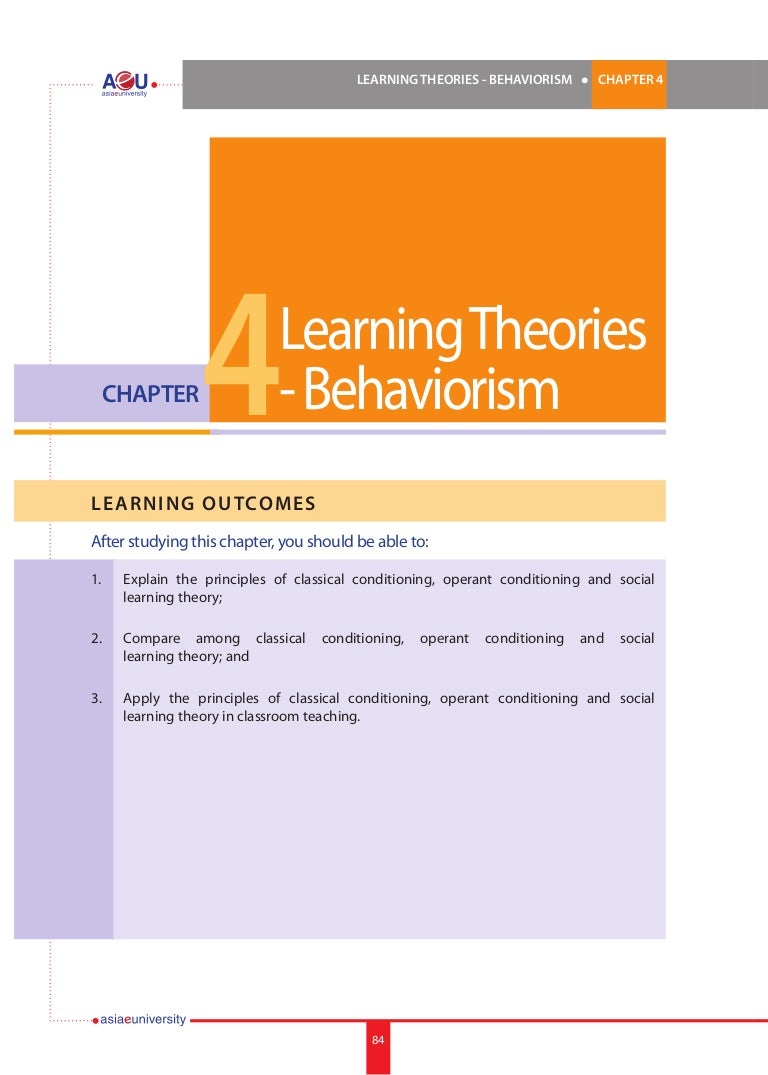 Source: slideshare.net
Source: slideshare.net
Though such theories have been largely discounted some elements of behaviorismparticularly those related to radical behaviorism a theory promoted by noted psychologist BF. Watson 18781958 John Watson was the founder of behaviorist theory. A major object of study by behaviorists was learned behavior. Skinner rejected introspective methods as being subjective and unquantifiable. Watsons pioneering work on behaviorism and its applications Watson.
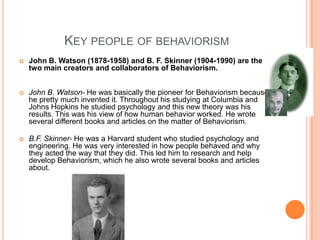 Source: slideshare.net
Source: slideshare.net
Hulls theory of behavior integrated psychology psychiatry sociology and anthropology by describing learning as the forging of connections between stimulus and response and then envisioning this mechanism as the mediator of all social and cultural activity. Hulls theory of behavior integrated psychology psychiatry sociology and anthropology by describing learning as the forging of connections between stimulus and response and then envisioning this mechanism as the mediator of all social and cultural activity. Jones 1924 before a working model of BT came to the fore. Quite innovatively for the time he found Freudian-based explanations of behavior too theoretical and disagreed with the eugenic idea of heredity. His practice of the science of behaviorism which studies what people do and makes predictions as a result of those observations showed him that human conditioning comes as a result of inner reactions to stimuli.
 Source: slideplayer.com
Source: slideplayer.com
This lecture established Watson as a pioneer of a new school of thought that would later become known as behaviorism. Behaviorism started as a reaction against introspective psychology in the 19th century which relied heavily on first-person accounts. Watsons theory of behavior explains all human actions as responses to stimuli. Jones 1924 before a working model of BT came to the fore. A major object of study by behaviorists was learned behavior.
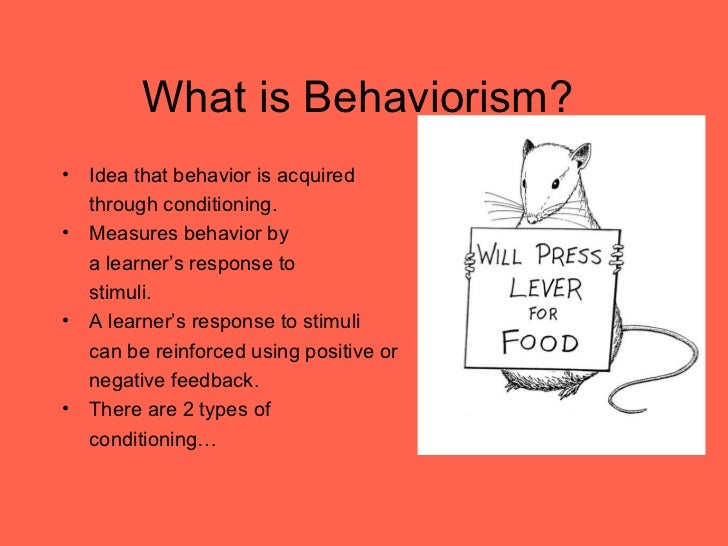 Source: fierceautie.com
Source: fierceautie.com
Behaviorism is a branch of psychology which as its name indicates is based on the observation of the conduct and the analysis of it. Pavlov studied a form of learning behavior called a conditioned reflex in which an animal or human produced a reflex unconscious response to a stimulus and over time was conditioned to produce the response to a different stimulus that. Skinner like Watson also recognized the role of internal mental events and while he agreed such private events could not be used to explain behavior he proposed they should be. Though such theories have been largely discounted some elements of behaviorismparticularly those related to radical behaviorism a theory promoted by noted psychologist BF. Behaviorism according to Watson was the science of observable behavior.
 Source: slideplayer.com
Source: slideplayer.com
Jones 1924 before a working model of BT came to the fore. Behaviorism emerged as a counterposition to psychoanalysis and aimed to provide a scientific demonstrable and measurable basis for Psychology. The first major finding with respect to behaviorism was Pavlovs dog experiments published in 1897 initiating a range of other behavioral experiments such. Radical behaviorism was founded by BF Skinner and agreed with the assumption of methodological behaviorism that the goal of psychology should be to predict and control behavior. This lecture established Watson as a pioneer of a new school of thought that would later become known as behaviorism.

Behaviorism emerged as a counterposition to psychoanalysis and aimed to provide a scientific demonstrable and measurable basis for Psychology. History of behaviorism. The main principle comprises changing environmental events that are related to a persons behavior. Fifty years had passed since John B. Behavior modification is a set of therapies techniques based on operant conditioning Skinner 1938 1953.
 Source: slidetodoc.com
Source: slidetodoc.com
Behavior modification is a set of therapies techniques based on operant conditioning Skinner 1938 1953. Pioneers such as Watsonand Pavlovbegan to experiment. Behaviorism started as a reaction against introspective psychology in the 19th century which relied heavily on first-person accounts. Pavlov studied a form of learning behavior called a conditioned reflex in which an animal or human produced a reflex unconscious response to a stimulus and over time was conditioned to produce the response to a different stimulus that. For example the reinforcement of desired behaviors and ignoring or punishing undesired ones.
 Source: pdfprof.com
Source: pdfprof.com
The four main psychologists who lead to the development of behaviorist theory were Watson Pavlov Thorndike and Skinner. Watson 18781958 John Watson was the founder of behaviorist theory. The four main psychologists who lead to the development of behaviorist theory were Watson Pavlov Thorndike and Skinner. Behaviorism emerged as a counterposition to psychoanalysis and aimed to provide a scientific demonstrable and measurable basis for Psychology. The first major finding with respect to behaviorism was Pavlovs dog experiments published in 1897 initiating a range of other behavioral experiments such.
 Source: pinterest.com
Source: pinterest.com
Jones 1924 before a working model of BT came to the fore. Behavior modification is a set of therapies techniques based on operant conditioning Skinner 1938 1953. Watsons pioneering work on behaviorism and its applications Watson. Skinner rejected introspective methods as being subjective and unquantifiable. This lecture established Watson as a pioneer of a new school of thought that would later become known as behaviorism.
 Source: courses.lumenlearning.com
Source: courses.lumenlearning.com
Fifty years had passed since John B. He translated Pavlovs work with dogs into everyday life and in particular the field of advertising. Though such theories have been largely discounted some elements of behaviorismparticularly those related to radical behaviorism a theory promoted by noted psychologist BF. Watsons pioneering work on behaviorism and its applications Watson. Pavlov studied a form of learning behavior called a conditioned reflex in which an animal or human produced a reflex unconscious response to a stimulus and over time was conditioned to produce the response to a different stimulus that.
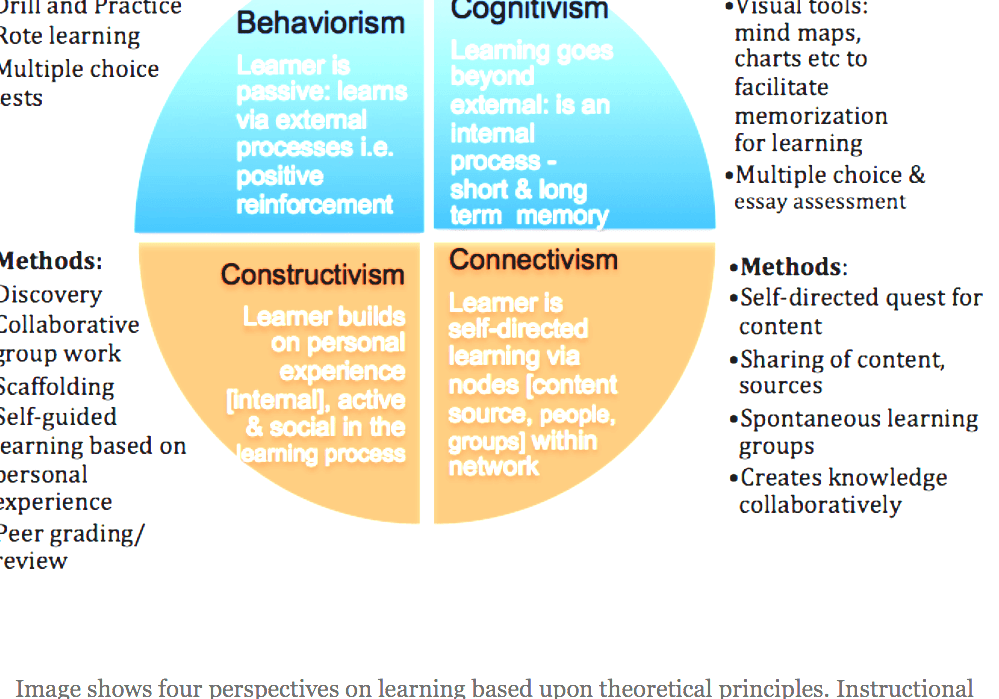 Source: learningcurveformula.blogspot.com
Source: learningcurveformula.blogspot.com
Fifty years had passed since John B. The first major finding with respect to behaviorism was Pavlovs dog experiments published in 1897 initiating a range of other behavioral experiments such. Pioneers such as Watsonand Pavlovbegan to experiment. Skinner rejected introspective methods as being subjective and unquantifiable. Behaviorism is a theoretical approach in psychology that emphasizes the study of behavior that is the outwardly observable reactions to a stimulus of an organism whether animal or human rather than the content of the mind or the physiological correlates of behavior.
 Source: slidetodoc.com
Source: slidetodoc.com
Behaviorism according to Watson was the science of observable behavior. Largely centered in the United States behaviorism had an early stage. Early work in the field of behavior was conducted by the Russian physiologist Ivan Pavlov 18491936. Behavior modification is a set of therapies techniques based on operant conditioning Skinner 1938 1953. Pavlov studied a form of learning behavior called a conditioned reflex in which an animal or human produced a reflex unconscious response to a stimulus and over time was conditioned to produce the response to a different stimulus that.
 Source: courses.lumenlearning.com
Source: courses.lumenlearning.com
Watsons pioneering work on behaviorism and its applications Watson. His practice of the science of behaviorism which studies what people do and makes predictions as a result of those observations showed him that human conditioning comes as a result of inner reactions to stimuli. Largely centered in the United States behaviorism had an early stage. Watson was a major proponent of shifting the focus of psychology from the mind to behavior and this approach of observing and controlling behavior came to be known as behaviorism. Watson made great advances in social science through the rigor of his work and his concern for observable behavior rather than musing about internal mechanisms.
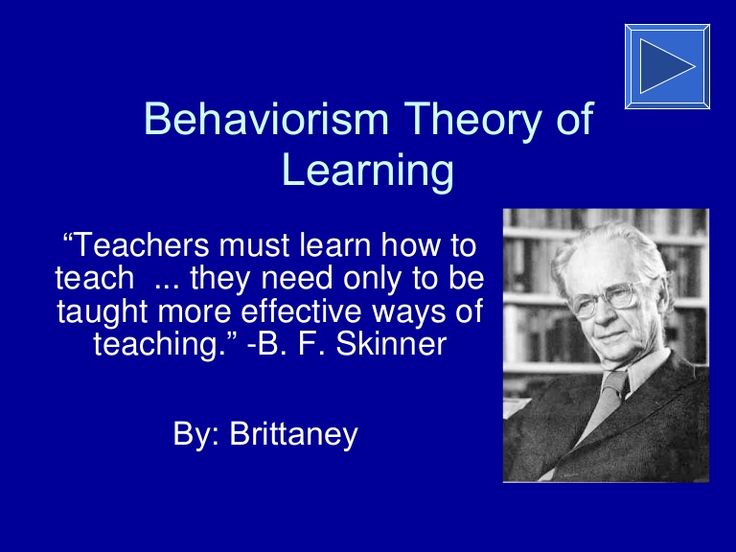 Source: pinterest.com
Source: pinterest.com
The first major finding with respect to behaviorism was Pavlovs dog experiments published in 1897 initiating a range of other behavioral experiments such. Hulls theory of behavior integrated psychology psychiatry sociology and anthropology by describing learning as the forging of connections between stimulus and response and then envisioning this mechanism as the mediator of all social and cultural activity. Skinner like Watson also recognized the role of internal mental events and while he agreed such private events could not be used to explain behavior he proposed they should be. Pioneers such as Watsonand Pavlovbegan to experiment. Though such theories have been largely discounted some elements of behaviorismparticularly those related to radical behaviorism a theory promoted by noted psychologist BF.
 Source: pinterest.com
Source: pinterest.com
Behaviorism is a branch of psychology which as its name indicates is based on the observation of the conduct and the analysis of it. Watson made great advances in social science through the rigor of his work and his concern for observable behavior rather than musing about internal mechanisms. A major object of study by behaviorists was learned behavior. Largely centered in the United States behaviorism had an early stage. The build-up and breakdown of habit was thus interpreted as the key to all behavior.
 Source: slideplayer.com
Source: slideplayer.com
Radical behaviorism was founded by BF Skinner and agreed with the assumption of methodological behaviorism that the goal of psychology should be to predict and control behavior. For example the reinforcement of desired behaviors and ignoring or punishing undesired ones. Behaviorism is a theoretical approach in psychology that emphasizes the study of behavior that is the outwardly observable reactions to a stimulus of an organism whether animal or human rather than the content of the mind or the physiological correlates of behavior. Watsons pioneering work on behaviorism and its applications Watson. Behaviorism started as a reaction against introspective psychology in the 19th century which relied heavily on first-person accounts.
 Source: sites.google.com
Source: sites.google.com
Watsons theory of behavior explains all human actions as responses to stimuli. Watson was a major proponent of shifting the focus of psychology from the mind to behavior and this approach of observing and controlling behavior came to be known as behaviorism. Behaviorism is a theoretical approach in psychology that emphasizes the study of behavior that is the outwardly observable reactions to a stimulus of an organism whether animal or human rather than the content of the mind or the physiological correlates of behavior. Hulls theory of behavior integrated psychology psychiatry sociology and anthropology by describing learning as the forging of connections between stimulus and response and then envisioning this mechanism as the mediator of all social and cultural activity. Behaviorism emerged as a counterposition to psychoanalysis and aimed to provide a scientific demonstrable and measurable basis for Psychology.
This site is an open community for users to submit their favorite wallpapers on the internet, all images or pictures in this website are for personal wallpaper use only, it is stricly prohibited to use this wallpaper for commercial purposes, if you are the author and find this image is shared without your permission, please kindly raise a DMCA report to Us.
If you find this site serviceableness, please support us by sharing this posts to your preference social media accounts like Facebook, Instagram and so on or you can also save this blog page with the title who discovered behaviorism theory by using Ctrl + D for devices a laptop with a Windows operating system or Command + D for laptops with an Apple operating system. If you use a smartphone, you can also use the drawer menu of the browser you are using. Whether it’s a Windows, Mac, iOS or Android operating system, you will still be able to bookmark this website.






